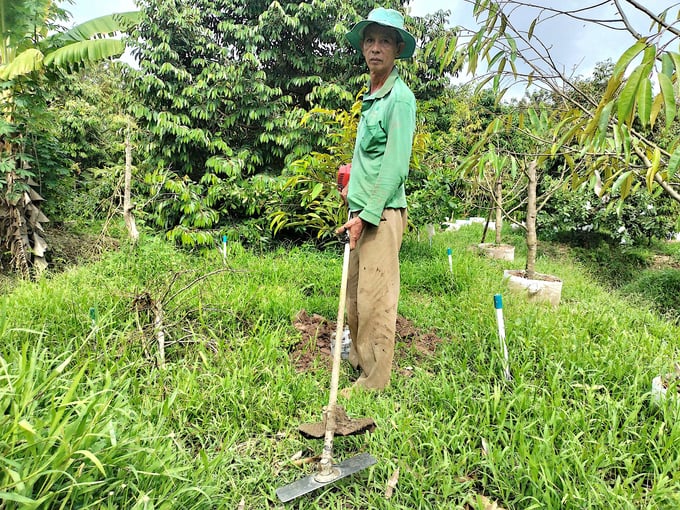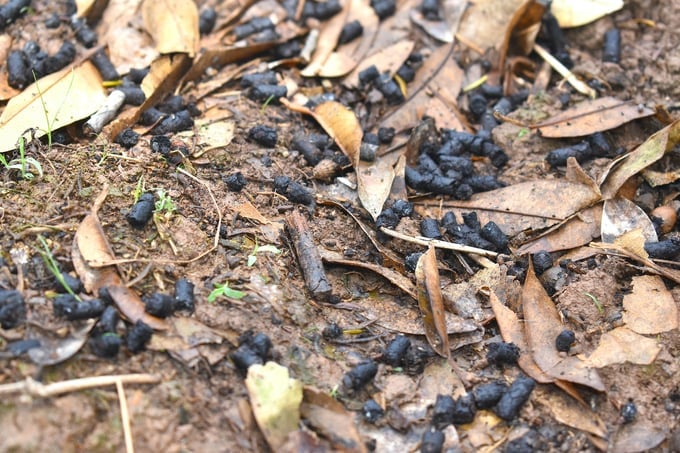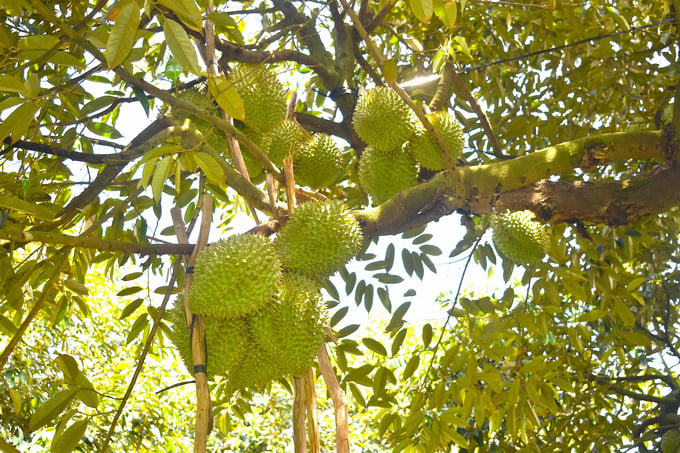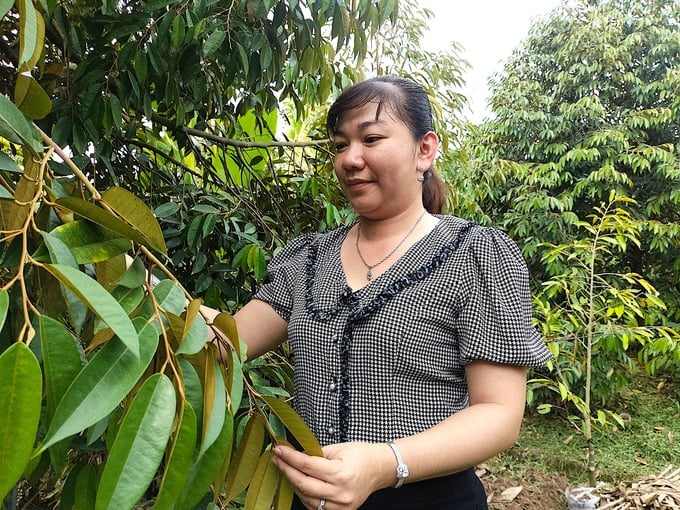June 3, 2025 | 06:49 GMT +7
June 3, 2025 | 06:49 GMT +7
Hotline: 0913.378.918
June 3, 2025 | 06:49 GMT +7
Hotline: 0913.378.918
Son Dinh Durian Cooperative Group, located in Cho Lach district, Ben Tre province, has been implementing an organic durian farming model spanning a total area of 9.62 hectares since 2020. Notably, the farming area is concentrated in Son Phung and Phung Chau hamlets, and Son Dinh commune.
With determination and support from scientists, local governments, and community organizations, the model received a certification for meeting Vietnam's organic agriculture standards in late 2023, accredited by the FAO Certification and Testing Corporation.

Le Ngoc Son, head of the Son Dinh Durian Cooperative Group, shared that prior to adopting organic production practices, cooperative members are experienced in VietGAP-compliant durian farming, which facilitated the transition. Photo: Minh Dam.
Local farmers reported several challenges during the initial phase of the transition from traditional to organic production. Namely, yields decreased by 20% whereas investment costs increased. Additionally, farmers must strictly adhere to organic farming practices; maintain detailed logbooks; use approved biological pesticides and implement corresponding quarantine measures during harvest; avoid harmful chemicals for flower induction and fruit development; and manage pests using Integrated Pest Management (IPM).
During post-harvest management, the use of organic fertilizer increased by 25% compared to that of traditional farming practices. Conversely, the use of inorganic fertilizers reduced by nearly 50%. At present, farmers utilize organic fertilizer throughout the entire crop cycle. To further reduce costs, cooperative members also produce their own organic fertilizer from agricultural by-products to nourish the durian trees.
Following the adoption of new organic farming practices, the cooperative group's durian yields have fully recovered; and the soil has become more fertile and friable. Le Ngoc Son, head of the Son Dinh Durian Cooperative Group, noted that the members' prior experience with VietGAP standards facilitated the transition to organic farming, with proficient application of new techniques.
"Farmers have great confidence in the scientists' guidance, so the transition process was straightforward, and no one gave up halfway," Son added.

Organic fertilization for durian trees. Photo: Minh Dam.
Following the transition, Le Ngoc Son and all members of the Son Dinh Durian Cooperative Group have praised the organic farming model for its numerous benefits. Firstly, it protects the health of on-site laborers. Secondly, it protects the environment by eliminating chemical use and reducing waste from pesticide containers, thereby maintaining product safety. As a result, consumers are confident in the group's product quality.
"The soil has improved in terms of texture and moisture retention, resulting in healthier and more resilient durian trees. During this year's severe heatwaves and a river salinity level of nearly 0.3‰, we refrained from watering the trees for four consecutive days, yet they remained unaffected," affirmed Son.
According to farmers' general assessments, a key benefit of organic farming practices is the increased longevity of the crops. This crucial factor has garnered widespread agreement among farmers. Additionally, it reduces production costs, increases income, promotes food safety, and contributes to environmental protection. Moreover, the organic farming model fosters production linkages, facilitates the coordinated transfer of scientific and technical knowledge, simplifies disease management, promotes product uniformity, and boosts overall yield.

Farmers have enthusiastically embraced organic durian farming practices. Photo: Minh Dam.
To date, all 21 member households of the Son Dinh Durian Cooperative Group are implementing organic farming practices with a 100% success rate. Average yields reach 25 tons per hectare for off-season crops, and 35 tons per hectare for peak season crops. Notably, 15 member households earned over 1 billion VND per hectare from organic durian farming in 2023. The remaining households earned a minimum of 300 million VND per year due to smaller farming areas and younger trees with lower yields.
"Some households even earned over 3 billion VND per hectare. Based on last year's successful practices, all members are determined to maintain and sustain this model at any cost. Accordingly, all cooperative group members and local farmers must understand the value of organic farming," emphasized Le Ngoc Son.
For the certified organic products made by Son Dinh Durian Cooperative Group, local businesses have signed contracts to purchase at prices 10-15% higher than the market rate.

Organic durian yield reached 2.5 tons per hectare for off-season crops, and 3.5 tons per hectare for peak season crops. Photo: Minh Dam.
Moving forward, local farmers are advocating for the expansion of the organic farming model. Nguyen Huu Long, a member of the Son Dinh Durian Cooperative Group, commented, "Nowadays, green agricultural production through organic models is essential for sustainable agriculture. I hope that local governments will support us in the expansion of this model, and introduce stable, long-term purchasing agreements with businesses."
Over three years since its inception, the Farmers' Union of Son Dinh commune, alongside local governments and agricultural associations in various hamlets, has selected pioneering households eager to establish the most effective models.
According to Trang Thi Hoai Thuong, Vice Chairperson of the Farmers' Union in Son Dinh commune, the commune stands to be recognized as the first region in Ben Tre province to achieve organic certification for durian farming. Consequently, the Union plans to expand this initiative to all members across remaining hamlets, with the aim of creating durian products that meet strict safety and quality standards, and obtaining production unit codes for export.
Under the Organic Agriculture Development Project for the years between 2022 and 2025, with a vision towards 2030, Ben Tre province aims to develop high-value, sustainable organic agriculture that is environmentally friendly and integrated into a circular agricultural economy. This strategic development direction aims to meet domestic consumption needs and enhance export competitiveness, thereby matching the province's organic farming capacity with regional and national norms.

Trang Thi Hoai Thuong, Vice Chairperson of the Farmers' Union in Son Dinh commune, visiting an organic durian farm. Photo: Minh Dam.
Accordingly, the province aims to have 11-13% of its agricultural land under organic production, and 1-2% of its aquaculture area under organic production by 2025. The goal for organic coconut production is 20,000 hectares by 2025 and 30,000 hectares by 2030. Additionally, pomelo production under PGS organic standards is projected to cover 50 hectares by 2025 and 200 hectares by 2030.
In addition to the 9.62 hectares of recently certified organic durian farming area, Ben Tre province is currently managing 12,883 hectares of certified organic coconut farming area, 10 hectares of organic pomelo farming area, 1.3 hectares of organic vegetable farming area, and 100 hectares of organic rice farming area.
The successful certification of Ben Tre's first organic durian farming model will motivate farmers throughout the province to expand their organic farming areas, contributing to the successful implementation of the province's organic agriculture development plan.
Vo Tien Si, Deputy Director of Ben Tre province's Department of Agriculture and Rural Development, stated that the future development direction for the province's agricultural sector will focus on green agriculture and agriculture. This initiative aims to promote innovation and improve labor productivity, thereby contributing to green growth, economic restructuring, and fostering a shift towards an efficient growth model. The ultimate goal is sustainable environmental development and advancement of a green economy.
Translated by Nguyen Hai Long

(VAN) TTC AgriS and IFC signed a strategic partnership to develop a sustainable agricultural value chain, aiming to achieve the Net Zero target by 2035.

(VAN) Seafood by-products are opening a new path, combining green growth and technological innovation to enhance the industry's value.

(VAN) Mr. Nguyen Thanh Cong, Vice Chairman of the Son La Provincial People's Committee, reflects on Son La’s journey from barren hills to fruitful orchards after a decade of hard work.

(VAN) FAO’s Director-General addresses the 5th Baghdad International Water Conference.
/2025/05/26/1716-4-nongnghiep-191706.jpg)
(VAN) Chain linkages, technological innovation, and raw material zoning are three strategic pillars for the coconut industry to strongly develop and elevate its position on the global agricultural map.
![Advanced mariculture – an inevitable trend: [4] Accompanied by scientists](https://t.ex-cdn.com/nongnghiepmoitruong.vn/608w/files/sohk/2025/05/13/1941-pgsts-vo-van-nha-140958_717.jpg)
(VAN) According to Assoc. Prof. Dr. Vo Van Nha, Director of the RIA III, the development of advanced offshore mariculture is no longer an option but an essential path for Vietnam’s fisheries sector.

(VAN) Vietnam is intensifying the development of mollusk farming areas that meet international standards, aiming for sustainable growth and enhancing its export position in the global seafood market.